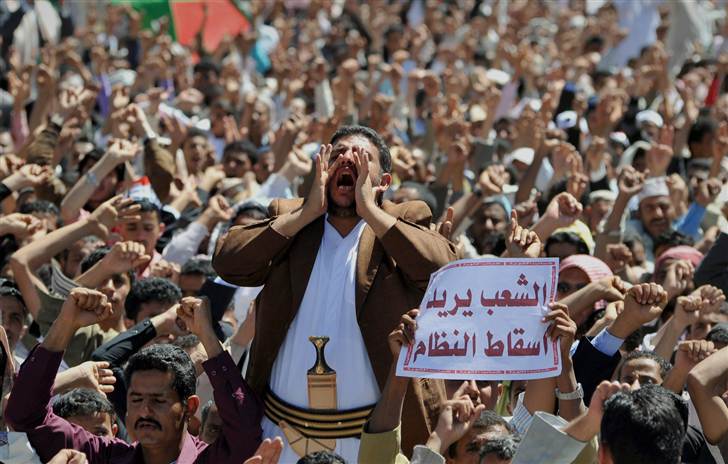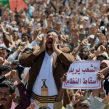
Special Report from Yemen: The Looming Threat of Tribal War
By:

On February 28, Yemeni President Ali Abdullah Salih announced his offer to form a national unity government that would be composed of members from all of Yemen’s opposition parties. The offer was quickly rejected by most members of the coalition of opposition parties, the Joint Meeting Party (JMP), and by the anti-government protesters that are demonstrating throughout Yemen (Mareb Press, February 28). On the same day, Yemeni cleric Sheikh Abdul Majeed al-Zindani, the head of Yemen’s Society of Religious Scholars and an influential member of the opposition party Islah (Yemeni Congregation for Reform), reaffirmed the right of the anti-government protesters to continue to call for the ouster of President Salih (al-Tagheer, February 28). On March 1, thousands of anti and pro-government protesters took to the streets in what was billed as another “Day of Rage” by anti-government demonstrators (al-Jazeera, March 1).
Despite the growing and widespread protests against President Salih and his government, the Yemeni president seems determined to retain his grip on power—at least until the 2013 presidential elections. Salih has vowed to defend the Republic “until his last drop of blood.” The impasse between the Salih government and the anti-government protesters threatens to devolve into a conflict fought along tribal lines if a compromise is not reached.
The Yemeni Army and Its Tribal Dimension
In a meeting with his High Security Council composed of Yemen’s ranking military commanders on February 27, Salih warned that Yemen would fragment into a patchwork of warring factions unless the military defended the nation’s unity (al-Thawra, February 27). The Yemeni military seems to be standing behind Salih, apart from a few reports of enlisted men joining protesters in Taizz and a limited revolt over unpaid salaries by an armored brigade based near the town of Sadah in northern Yemen (Mareb Press, February 26). The Salih government has raised the salaries of the enlisted men and has even been flying in cargo loads of qat (the mild stimulant chewed by Yemenis) from Ethiopia to the garrisons in the south.
Over the 32 years of his reign, Salih, who is a former tank commander, has paid keen attention to the tribal backgrounds of his general officers and field officers. The majority of the general officers are drawn from Salih’s tribe, the Sanhaan, and many are directly linked with his family and or extended family through marriage. Most notably, the Republican Guard and the Central Security Service, the most able and well equipped of Yemen’s armed forces, are commanded by Salih’s son and nephew respectively. The field officers’ backgrounds are more varied but are still thoroughly vetted in terms of tribal affiliations. The junior officer core is more of an unknown, but even within its ranks there are few southerners and most are still from the northern tribes from which Salih has traditionally drawn most of his support.
The tribal affiliations of Yemen’s general and field officers likely mean that Salih can expect continued loyalty from much of his armed forces, especially if threatened by a Hashid-backed alliance led by members of the al-Ahmar family. The loyalty of his general officers has been further buttressed by often exorbitant salaries that allow them to carve out fiefdoms of their own. Some of the more senior officers are in a position to guarantee the loyalty of their troops, if necessary, with cash bonuses and other perks. Many within the general and field officer cores have also sought to make sure that a majority of the enlisted men within their ranks are from their own tribes and clans, to further guarantee loyalty.
While the tribal affiliations of the Yemeni Army, especially within its officer core, are likely to guarantee a significant level of loyalty to the regime, it should be noted that the Yemeni Army’s morale suffers from poor pay and living conditions. In addition, it was dealt a blow by the prolonged war against the Houthis in northern Yemen. Salaries for enlisted men, despite Salih’s recent promise of an increase, remain low, with many soldiers owed months of back pay. Corruption is also endemic. During the last war against the Houthis (2009-2010), there were numerous reports of officers selling ammunition and supplies and leaving their troops with neither food nor bullets to fight with.
The same tribal affiliations that guarantee a certain level of loyalty to the regime also mean that if the current impasse between the Salih regime and the opposition does devolve into conflict, much of the army could unravel. If tribal feuds were triggered, these same feuds would likely involve men within the army, both officers and especially enlisted men, who hail from tribes across the north.
Salih’s Options Narrow
Despite the almost daily concessions from Salih, the opposition remains steadfast in its demands for him to step down. The lack of engagement on the side of the opposition and anti-government demonstrators means that Salih, and the hundreds and even thousands of men who have directly benefited from his regime, will be increasingly forced to fall back on tribal affiliations for support. This was Salih’s initial strategy when the protests began and it remains his primary strategy. In response to the ”Day of Rage” on March 1, several thousand more tribesmen, many of whom had just arrived from the countryside, poured into Yemen’s Tahrir Square to support Salih.
So far, the Yemeni Army and security forces have been relatively restrained in their response to protesters, despite at least 27 deaths among anti-government demonstrators (Amnesty International, March 1). Salih has reportedly instructed the armed forces and security services to only interfere with the protesters if they threaten public property. The Yemeni regime is clearly aware of what the international and domestic response will be if widespread violence is used against the protesters. However, the use of the military and security forces is not the only option for attempting to contain protests. As evidenced by the early fights between pro-Salih protesters, many of whom were drawn from loyal tribes, and the anti-government demonstrators, Salih and his regime can and will make use of tribal allies and quite possibly irregular forces to maintain its grip on power. The Yemeni Army has a long history, most recently in the wars against the Houthis, of using tribal levies, many of whom are far better fighters than the conscripts that make up the majority of the army.
Conflict Between the Salih Regime and the al-Ahmar Family?
The al-Ahmar family is one of Yemen’s wealthiest and most powerful families and has historically headed up the Hashid tribal confederation. The Hashid (Hashid is also a tribe unto itself) tribal confederation is smaller than Yemen’s other tribal confederation, the Bakil. However, the Hashid confederation has been more cohesive than the Bakil over much of the last century. On February 26, Sheikh Hussein bin Abdullah al-Ahmar, of the al-Ahmar family, resigned from Salih’s ruling party, the General Peoples’ Party (GPC), at a rally in Amran, north of Sana’a (al-Jazeera, February 26). In a strongly worded speech given before several thousand cheering tribesmen, Sheikh Hussein al-Ahmar called on Salih to step down and compared his rule with that of Yemen’s former imams. Hussein al-Ahmar’s resignation followed a year in which his brother, Hamid al-Ahmar, has repeatedly and publicly criticized President Salih and his government.
The very public and growing divide between the al-Ahmar family and Salih threatens to add another dimension to what is already a multifaceted rebellion. The al-Ahmar family can and is marshaling tribal support. This support increasingly extends beyond the Hashid confederation, many of whose members still support Salih, to some members of the Bakil confederation—most importantly to some members of the Khawlan tribe. The Khawlan tribe, a kind of sub-confederation made up of seven separate tribes, occupies territory to the east of Sana’a and is one of Yemen’s best armed and most powerful tribes. In addition to the Khawlan, the Abidah and Jadaan tribes are also standing against Salih, and nominally with the al-Ahmar family. The Abidah and Jadaan, whose territories cover parts of the governorate of Marib, have been hit hard by the “war on terror.” Many members of the Abidah tribe in particular dispute that there are any al-Qaeda operatives in their territories and view al-Qaeda in the Arabian Peninsula (AQAP) as an excuse for Salih to attempt to assert control over the restive oil producing governorate.
The old joke about the battle between the two houses of al-Ahmar (Salih is from a village called “Bait al-Ahmar”) has been revived with many Yemenis anxiously discussing what many think could become a war between the al-Ahmar family and the Salih regime. The anxiety is shared by many of the anti-government protesters who fear that the powerful al-Ahmar brothers will attempt to takeover what they view as their revolution.
Sana’a the Key to Yemen
A Yemeni saying that dates back at least three hundred years says that whoever controls Sana’a controls Yemen. While this has not always been true, the strategic and psychological importance of the city is indisputable. If the protests in Yemen devolve into a tribal conflict, Sana’a will likely be the center of the fight. The collective memory of the looting of the city by tribesmen who descended on Sana’a as recently as 1948 at the behest of Imam Ahmed after his father, Imam Yahya, was assassinated is still strong and is feared by many. After the 1994 civil war, much of the port city of Aden was looted by tribal levies that were fighting alongside the regular army. If tribal conflict breaks out and the army and security services become mired in conflict themselves, security in Sana’a could be fully compromised as various groups battle for control of the city which sits astride a strategic crossroad just as it did at its founding 2500 years ago.
The importance of Sana’a is demonstrated by both Salih’s and the al-Ahmar family’s focus on recruiting and shoring up support among the tribes who surround Sana’a and who can control the roads that link the city with the rest of the country.
Conclusion
President Ali Abdullah Salih’s determination not to step down is no doubt based on a number of reasons but perhaps the most important and simple one is that he knows he can count on significant support from tribal allies—at least for now. However, at the same time that Salih and his allies are focused on shoring up tribal support in the north, unrest in the south, where an already active secessionist movement is gaining momentum, is spreading. The longer the impasse between Salih and the anti-government protesters and the opposition continues, the greater the risk of tribal conflict. If either Salih or the opposition decides to fight, Yemen will likely plunge into tribal conflict that the country cannot afford.
Michael Horton is an independent analyst who specializes in Yemen and the Horn of Africa. He is a frequent contributor to The Jamestown Foundation’s Terrorism Monitor publication. He also writes for Jane’s Intelligence Review, Intelligence Digest, Islamic Affairs Analyst, and the Christian Science Monitor. Mr. Horton studied Middle East History and Economics at the American University of Cairo and Arabic at the Center for Arabic Language and Eastern Studies in Yemen. Michael frequently travels to Yemen, Ethiopia, and Somalia.




